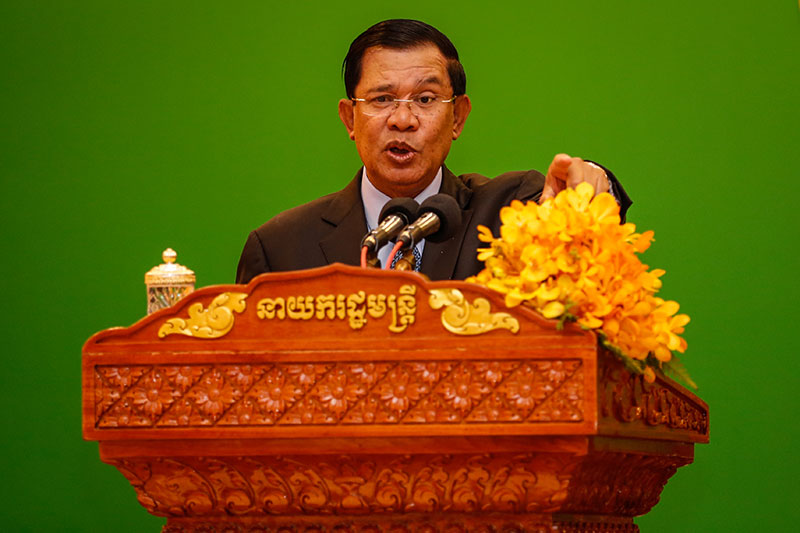Following Prime Minister Hun Sen’s announcement that a countrywide review of economic land concessions (ELCs) had resulted in the reappropriation of nearly 1 million hectares, land rights advocates on Friday cast doubt on the claim, citing a lack of transparency in how the review was carried out.
In 2012, Mr. Hun Sen placed a freeze on the issuance of new ELCs —which are routinely linked to rights abuses and deforestation—and promised that his government would review all 2 million hectares of concession land to determine whether it was being properly used.

The prime minister announced the results of the review on Thursday, and pledged to distribute the confiscated land to Cambodia’s poorest families. “Now, only 1,090,000 hectares of land are allowed to remain for investment and almost a million hectares of land was taken back,” he said.
However, civil society leaders said on Friday that the government had not released enough information to allow them to assess the impact of Mr. Hun Sen’s announcement. Most crucial, they said, was a breakdown of which parcels of land had been taken back from which companies.
“Without additional details and documents, it’s not possible for us to confirm the accuracy of this figure,” Naly Pilorge, director of rights group Licadho, said in an email.
“If the government includes land from logging concessions that were suspended 15 years ago, the figure could amount to about one million hectares but without more details and documents, it’s not possible to assess this claim or figure,” she said.
Latt Ky, head of rights group Adhoc’s land and natural resources rights program, agreed that there was not enough publicly available information to get a handle on the situation.
“We do not know if it’s accurate or not,” Mr. Ky said. “It would be easy to verify the figures if the figures had been released with detailed information relating to every company and province.”
Mr. Ky said he had attempted to search for more information on government websites, but to no avail. Villagers affected by ELCs, he said, were even more confused.
“Even we, a non-governmental organization, have faced difficulty in finding information. Therefore, imagine what it’s like for the citizens receiving this information, especially those who have suffered through economic land concessions,” he said.
Ou Virak, a political analyst and head of the Future Forum think tank, said he thought it was highly unlikely that the reappropriated 1 million hectares would ever be distributed to the poor, due to the logistical difficulties of such a scheme.
“No, I think that’s going to be very, very difficult. I don’t know how they’re going to hand it back,” he said. “Are they admitting that they actually confiscated them from the poor families, this 1 million hectares?”
Mr. Virak said the government should also focus on rejuvenating the country’s forests, large swaths of which have been plundered inside the boundaries of private concessions.
“Do you know who it should be given back to? The forest. They should make sure that land is reforested and if there’s any community that wants it back, it will be the indigenous communities who make use of the forest but are not owning it,” he said.
Equitable Cambodia director Eang Vuthy welcomed the idea of handing the 1 million hectares back to the country’s poor, but said returning the land to its former owners should be a priority.
“That is good news, but we want to see that real action has been taken, not just something on paper,” Mr. Vuthy said.
Both he and Ms. Pilorge cited a case in Oddar Meanchey province involving the Thai-owned sugar giant Mitr Phol, which has been accused of forcing some 2,000 families off their farms after obtaining concessions covering a combined 20,000 hectares in 2008.
In late 2014, the company gave up the concessions, having cleared much of the land but planted
little sugarcane. However, the land has still not been given
back to those who were kicked off.
“We all know that land belonged to the people prior to the company’s arrival to that area. There used to be rice fields and there used to be a village and we have documented this for years, so that should be prioritized and given back to the people,” Mr. Vuthy said.
Despite the lack of movement on the case so far, Huoy Mai, a representative of the Mitr Phol evictees, said she was optimistic about the prime minister’s announcement.
“Our villagers think that local authorities have ill intentions to keep the land for themselves; that’s why they’ve ignored requests to return the land to us,” Ms. Mai said.
“However, I am very positive that we will get our land after the prime minister made such a public announcement, as we really are poor and landless families,” she said.
Srun Darith, the Environment Ministry’s cabinet chief, declined to comment on the ELC review, while a spokesman for the Agriculture Ministry could not be reached.



